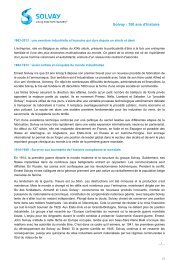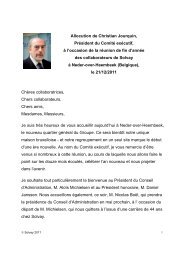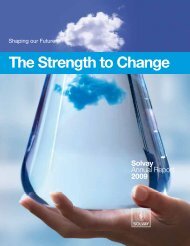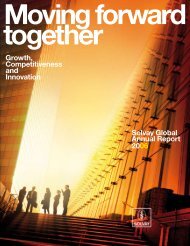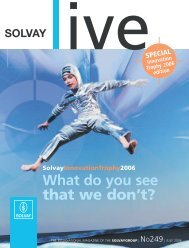2009 Reference document - Solvay
2009 Reference document - Solvay
2009 Reference document - Solvay
Create successful ePaper yourself
Turn your PDF publications into a flip-book with our unique Google optimized e-Paper software.
Rhodia has adopted the option offered by the amendment to IAS 19.<br />
Hence, the actuarial gains and losses on obligations or assets relating<br />
to post-employment benefits arising from experience adjustments<br />
and/or changes in actuarial assumptions are recognized directly in<br />
equity for the period in which they occur in consideration of the<br />
increase or decrease in the obligation. They are disclosed in the<br />
consolidated statement of income and expenses for the period.<br />
The actuarial gains and losses relating to other long-term benefits<br />
such as long service awards are fully recognized in profit or loss for<br />
the period in which they occur.<br />
The interest expenses arising from the reverse discounting of<br />
retirement benefits and similar obligations and the financial income<br />
from the expected return on plan assets are recognized in profit or<br />
loss from financial items.<br />
The amendment or introduction of a new post-employment or other<br />
long-term benefit plan may increase the present value of the defined<br />
benefit obligation for services rendered in previous periods, otherwise<br />
known as past service cost. This past service cost is recognized in<br />
profit or loss on a straight-line basis over the average period until<br />
the corresponding benefits are vested by employees. The benefits<br />
vested upon adoption or amendment of the plan are immediately<br />
recognized in profit or loss.<br />
Regulatory amendments without any compensation for beneficiaries<br />
are accounted for in actuarial gains and losses and not past service<br />
cost.<br />
The actuarial calculations of retirement obligations and other longterm<br />
benefits are performed by independent actuaries.<br />
2.18 Share-based payment<br />
Rhodia has set up various compensation plans for employees offering<br />
free shares, preferential stock subscription and stock purchase and<br />
subscription options.<br />
The fair value of services rendered by employees in consideration for<br />
the granting of shares or options represents an expense. This expense<br />
is recognized on a straight-line basis in the income statement over<br />
the vesting periods relating to these shares or options with the<br />
recognition of a corresponding adjustment in equity.<br />
The fair value of services rendered is measured in reference to the fair<br />
value of the shares or options on the grant date. Where appropriate,<br />
the cost of the non-transferability of shares by the holder, determined<br />
using observable market data on the grant date and the specific<br />
market characteristics of the Rhodia share, is taken into account.<br />
6<br />
Financial and Accounting Information<br />
Financial Statements<br />
At each balance sheet date, the Group re-estimates the number<br />
of shares or options likely to be vested. The impact of the revised<br />
estimates is recognized in profit or loss against a corresponding<br />
adjustment in equity.<br />
2.19 Provisions<br />
A provision is recognized when Rhodia has a legal or constructive<br />
obligation as a result of a past event, which can be reliably measured,<br />
and whose settlement is expected to result in an outflow of economic<br />
resources for Rhodia.<br />
Provisions are discounted in order to take into account market<br />
assessments of the time value of money using risk free rates net of<br />
inflation and specific to the relevant geographical areas. The impact of<br />
interest rate fluctuations and changes to estimated future cash flows<br />
is recognized in other operating expenses in the income statement.<br />
The interest expense (reverse discounting) is recognized in finance<br />
costs in the income statement.<br />
Environmental liabilities<br />
Rhodia periodically analyzes all its environmental risks and the<br />
corresponding provisions. Rhodia measures these provisions to the<br />
best of its knowledge of applicable regulations, the nature and extent<br />
of the pollution, clean-up techniques and other available information.<br />
Restructuring<br />
Restructuring comprises all measures designed to permanently<br />
adapt structures, production and employees to economic changes.<br />
A provision for restructuring is recognized when the Group has<br />
approved a detailed formal plan and has either started to implement<br />
the plan, or announced its main features to the public.<br />
2.20 Net sales and Other revenue<br />
Net sales and other revenue are measured at the fair value of the<br />
consideration received or receivable, net of returns, rebates and trade<br />
benefits granted and sales tax.<br />
Net sales comprise the sales of goods (goods and goods for resale)<br />
and value-added services corresponding to Rhodia’s know-how.<br />
Other revenue primarily includes commodity and utility trading<br />
transactions and other revenue deemed as incidental by the Group<br />
(e.g. temporary contracts following the sale of businesses).<br />
<strong>Reference</strong> Document Rhodia <strong>2009</strong> 141<br />
6


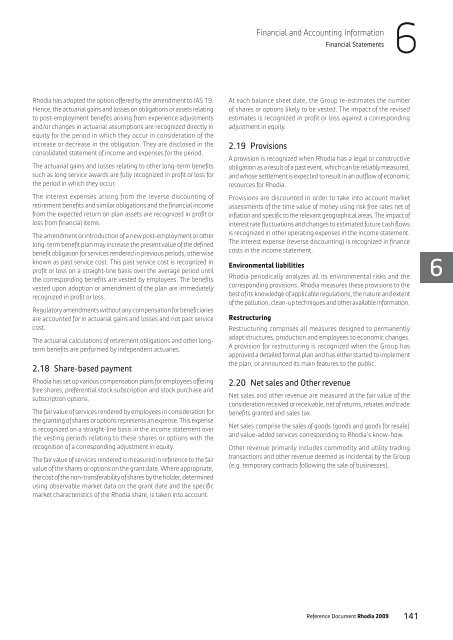

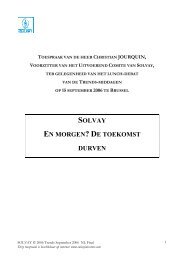
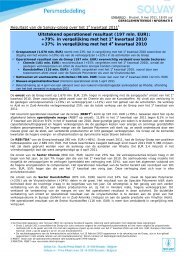
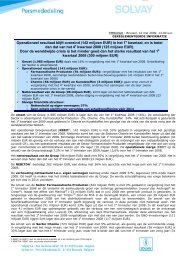

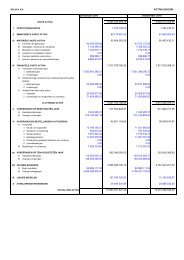
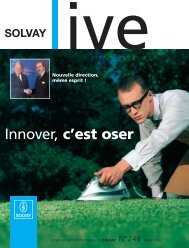
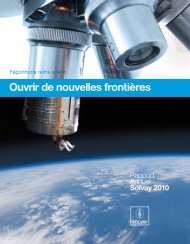
![PROC.1 [LETTRE] - Solvay](https://img.yumpu.com/16585746/1/184x260/proc1-lettre-solvay.jpg?quality=85)
